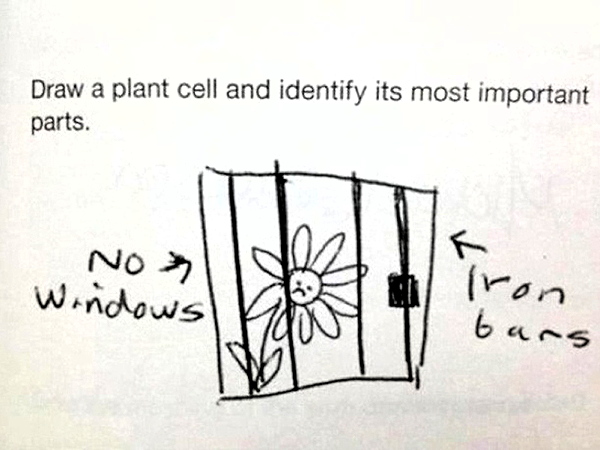This kid’s imaginative answer on a test reminds me of Kaitlin when she was old enough to have questions but not articulate enough to ask them in words.
We had given her a toy tool kit for Christmas, and it included a big plastic nut and bolt. So a day or two later she took the nut, making sure I was watching her, and climbed up into Andy’s easy chair. She turned around and sat facing me, still making sure I was watching, and put the nut into her mouth.
Sure enough, I responded the way she knew I would, “Nuts aren’t for putting in our mouth, they’re for screwing bolts into.” Uh, huh. She looked at Andy’s can of cashews sitting next to the chair, then she looked at me. Good point. I told her it was confusing, the same word can have different meanings.
Needless to say, she has done well in life.
February 9, 2020


Wow! She was one smart kid! I can see her doing well in life…
It made enough of an impression on me that I still remember it all these years later.
Scary smart kid!
LOLOLOL
Love this story!
xo
LOL Kaitlin did have a point about the nuts.
Funny picture and I would say they get an A for imagination.
I agree about the kid who answered the quiz. He was brilliant.
Cute story!
English language is so confusing and “nut” is a good example. A simple word in itself, complex in that there is another type of nut, the related to a person…and if you add an “s” even more confusing. i.e. “I’m nuts about making art, daily” v “how many cashew nuts does it take to change a light bulb”…opps let’s not get stuck in the word bulb!
I wonder how bad it is in other languages?
I think many languages have “one word” that translates to a phrase – and if you somehow change the pronunciation, just little you end up saying something unintentional. Or even misspell something, say instead of an “a” you put an “i”…of course, I think English can do that as well.
And then add local dialect or slang…and we are lost. BTW it’s late arvo here…
Then there are all the colloquialisms — see my answer to Nick below.
LOL! I’ve always thought she’s brilliant! xo
xo
and beautiful to boot.
Other languages can be equally confusing. In Italian for instance “buttare la pasta” can either mean to throw away the pasta or to cook the pasta. It makes you realise how much we understand from the context rather than from the word itself.
Thank you for the example. It’s been a long time since I’ve used a foreign language so I couldn’t remember any examples. I do remember problems with colloquialisms in all languages. When we were in France we thought buying comic books would be a great way to learn — the words had to be simple because they were for kids, right? Not at all. They were filled with colloquialisms and impossible to translate then. With Google there probably wouldn’t be such a problem now.
A wise child!
Then there’s Tempi, their pup. See today’s post.